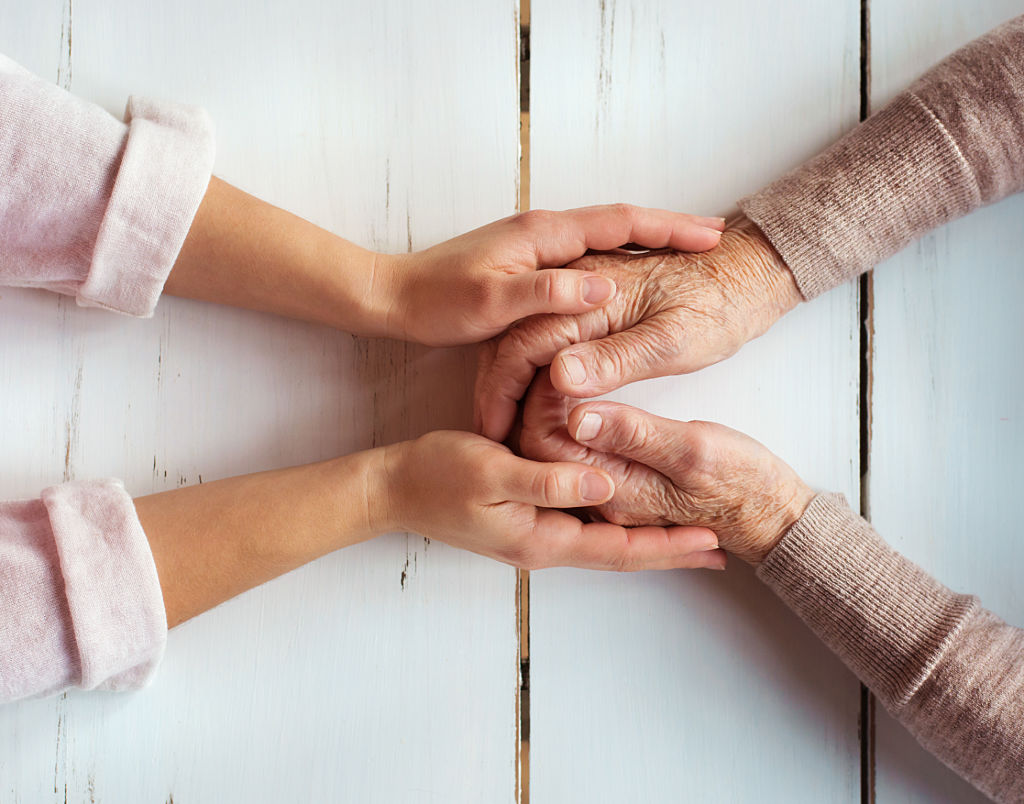Mastectomy Surgery: Patient Care Resources
Surgery is a common treatment for primary treatment for breast cancer. The type of surgery your team recommends is influenced the size, location, aggressiveness of your cancer, other risk factors, and your preferences.
Surgeries vary in the amount of tissue doctors remove. Mastectomy surgery removes the entire breast. If mastectomy provides a good treatment option, you will meet with a surgical oncologist to develop a plan. Surgery is different for every patient. Your surgical oncologist (cancer surgeon) will work with you to determine your preferred approach. We also help you prepare for your surgery and your recovery at home.
WHAT TO KNOW TO PREPARE FOR MASTECTOMY
1Understanding Your Condition
2Getting Your Diagnosis
3Planning Your Treatment
4Undergoing Treatment & Follow-Up
Breast Surgery: Patient Care Resources »
About Mastectomy for Breast Surgery »
Getting Ready for Mastectomy Surgery
Your care team has worked with you to develop the surgical plan that’s right for you, based on the details of your diagnosis. Your cancer surgeon has worked with you on an approach that is the least invasive and most effective surgery for the type of breast cancer you have.
Before
During
After
Before the morning of your surgery, you will meet with an anesthesiologist to discuss your options and preferences for sedation. The anesthesiologist will stand near your head to administer the anesthesia and monitor you before and during surgery. At this meeting, you and the anesthesiologist will:
- Review your medical history
- Discuss any allergies you may have
- Review the plan for anesthesia during your surgery
On the scheduled day, you will come in for your surgery.
The length of time for your surgery, hospital stay, and recovery depends on your individual case. Factors include the type of surgery you have and the details of your diagnosis.
Lymph node dissection
Lymph nodes are small glands that filter bacteria, viruses, cancer cells, and other impurities from the body. Axillary lymph nodes, near the breast in the armpit, are one of the first place breast cancer can spread.
You may need surgery to remove one or more lymph nodes, depending on the type of breast cancer you have, its stage, and other specifics. Your surgeon usually does lymph node surgery at the same time as your breast surgery.
The types of lymph node surgery are:
- Sentinel lymph node biopsy (SLNB): Removes 1 or a few lymph nodes, usually those nearest the breast:
- Axillary lymph node dissection (ALND): Removes many or all lymph nodes in the armpit area:
After a SLNB, a pathologist assesses the lymph node tissues for cancer. If the tissue contains no cancer cells, you don’t need further surgery. If the tissue does contain cancer, depending on the number of lymph nodes involved, you may need an ALND to remove additional lymph nodes or radiation therapy to treat the armpit area.
Come in for your post-op appointment
Your post-op appointment usually takes place 7 to 10 days after your surgery. We will work with you before your surgery to choose a day and time for this visit. During the appointment, you meet with your surgeon and other members of your care team to:
- Review the pathology report from your surgery
- Change your dressings, if needed, and assess your healing
- Address any concerns
Before the morning of your surgery, you will meet with an anesthesiologist to discuss your options and preferences for sedation. The anesthesiologist will stand near your head to administer the anesthesia and monitor you before and during surgery. At this meeting, you and the anesthesiologist will:
- Review your medical history
- Discuss any allergies you may have
- Review the plan for anesthesia during your surgery
On the scheduled day, you will come in for your surgery.
close Before
The length of time for your surgery, hospital stay, and recovery depends on your individual case. Factors include the type of surgery you have and the details of your diagnosis.
Lymph node dissection
Lymph nodes are small glands that filter bacteria, viruses, cancer cells, and other impurities from the body. Axillary lymph nodes, near the breast in the armpit, are one of the first place breast cancer can spread.
You may need surgery to remove one or more lymph nodes, depending on the type of breast cancer you have, its stage, and other specifics. Your surgeon usually does lymph node surgery at the same time as your breast surgery.
The types of lymph node surgery are:
- Sentinel lymph node biopsy (SLNB): Removes 1 or a few lymph nodes, usually those nearest the breast:
- Axillary lymph node dissection (ALND): Removes many or all lymph nodes in the armpit area:
After a SLNB, a pathologist assesses the lymph node tissues for cancer. If the tissue contains no cancer cells, you don’t need further surgery. If the tissue does contain cancer, depending on the number of lymph nodes involved, you may need an ALND to remove additional lymph nodes or radiation therapy to treat the armpit area.
close During
Come in for your post-op appointment
Your post-op appointment usually takes place 7 to 10 days after your surgery. We will work with you before your surgery to choose a day and time for this visit. During the appointment, you meet with your surgeon and other members of your care team to:
- Review the pathology report from your surgery
- Change your dressings, if needed, and assess your healing
- Address any concerns
close After
If you need treatment with surgery, our surgical oncology team will manage your care. You are also an important team member. Help us help you by asking questions and raising your concerns.
Your surgical oncology team includes a number of cancer experts:

Your Doctors
Surgical Oncologist
These surgeons specialize in treating cancer through traditional (open) and minimally invasive surgery. Surgical oncologists perform biopsies (taking tiny tissue samples) to test for cancer. They also surgically remove tumors, some surrounding breast tissue, and lymph nodes to evaluate them for the presence of cancer.
Breast Reconstructive Surgeon
If you have breast cancer surgery and choose to have your breast restored, a reconstruction surgeon will work on its size, shape, and appearance. Our breast reconstruction surgeons are plastic surgeons with specialty training in reconstructing (rebuilding and reshaping) breasts. If you choose breast reconstruction, you will meet with your reconstruction surgeon soon after you meet with your breast cancer surgeon.
Other doctors on your care team
Anesthesiologist
An anesthesiologist is a doctor who specializes in using medications to block pain, help you relax, or make you unconscious for surgery. Anesthesiologists also maintain your vital functions such as breathing, blood pressure, and heart rate during surgery. Depending on the type of surgery you have, you may need local (small area), regional (larger area), or general (overall) anesthesia.
Radiologist
A radiologist is a doctor who specializes in using imaging techniques including X-ray, ultrasound, computed tomography (CT), and magnetic resonance imaging (MRI). Our radiologists have additional training and experience in breast cancer care. These doctors interpret imaging results and take biopsies (when needed) to help confirm a diagnosis. You may not meet your radiologist, since these doctors usually work behind the scenes to determine your diagnosis.
Pathologist
Your pathologist performs and reads laboratory tests to determine the type and stage of breast cancer present. These doctors have special training to detect and diagnose cancer. They use a microscope to examine tissue samples taken during a biopsy. As with radiologists, you may not meet your pathologist.

Extended Care Team
This health care provider works in collaboration with your medical oncologist to help care for you during your treatment and follow up. An APP can be a physician’s assistant (PA) or nurse practitioner (NP). A nurse practitioner is an advance practice nurse who has completed graduate education and is trained to do physical exams, diagnose, prescribe, and treat medical conditions. Our APPs can help manage your side effects and help carry out your treatment plan safely. You may alternate visits between your APP and oncologist.
These specialized registered nurses provide one-on-one support to guide you through your breast cancer journey. MCCs serve as your point of contact to help manage your care, from your first appointment through follow-up visits. They assess your needs, answer your questions, make referrals, coordinate appointments, and provide patient education.
This team member helps with nonmedical issues such as scheduling your appointments, managing your paperwork, and requesting your medical records and disability paperwork.
If you need to stay in the hospital after surgery, a registered nurse will take care of you.
This team member greets you at the front desk and registers you for your appointments.
A surgery scheduler will arrange your pre-surgical appointments with your surgical oncologist. This staff member also schedules your surgeries
This type of doctor is doing postgraduate studies specializing in the care of patients with breast cancer.
This doctor has graduated from medical school and is in training (also called residency) at Stanford. Residents in their first year are also called interns.
This health care provider is a student enrolled in Stanford’s medical school who is studying to become a doctor.
This team member helps you during your doctor visits by:
- Bringing you to your exam room after you check in for an appointment
- Providing you with a hospital gown or other clothing for your physical exam
- Taking your vital signs before your doctor sees you
A staff member calls you before your first appointment to:
- Provide information that you need to know to prepare
- Provides a list of what you need to bring
- Helps gather your medical records
- Using the restroom
- Feeding yourself
- Managing your medications
- Driving
If you are meeting with a surgical oncologist or reconstruction surgeon or having surgery, a surgery scheduler will call you to arrange the details.

Support Services
PATHWELL SUPPORT SERVICES
PathWell is your connection to personalized support services before, during, and after your treatment. Our teams of doctors, nurses, social workers, spiritual care providers, nutrition experts, financial counselors, and more work with your oncology team to provide comprehensive specialized care to you and to your family.
- 650-498-6000 Ask for the PathWell team
Stanford Health Library
For confidential help with your health care questions, contact the Stanford Health Library. Professional medical librarians and trained volunteers, access journals, books, e-books, databases, and videos to learn more about medical conditions, treatment options, and related issues.
- 875 Blake Wilbur, Palo Alto: 1st floor near the cafe, 650-736-1960
- South Bay Cancer Center: 3rd floor lobby, 408-353-0197
Email us your questions: healthlibrary@stanfordhealthcare.org
